Content
Treating roses with copper sulfate is effective throughout the season. It is better to start spraying in March, before sap flows and buds begin to open, since the substance is chemically active and can burn young leaves and stems. For treatment, solutions of different concentrations are used - from 0.01% to 5%.
Is it possible to spray roses with copper sulfate?
Copper sulfate is an inorganic salt of copper(II) sulfate, formula CuSO4. Synonymous names are sulfuric or copper sulfate. It is produced in the form of a powder that is initially white in color. At the same time, the crystals absorb water well, so the color becomes rich blue. The powder dissolves well in water at room temperature, the solution has approximately the same color.
The substance is characterized by chemical activity due to the copper cation Cu2+, acting as an oxidizing agent. Used as a fungicide.Helps for the prevention and treatment of various fungal infections, including septoria, scab, rust, moniliosis and others.
Due to its solubility, the active component quickly penetrates into the roots of the plant and is absorbed. Therefore, gardeners use vitriol for foliar treatments and watering when there is a lack of copper. This is especially important for sandy and depleted soils, the composition of which is not so diverse and requires the addition of additional fertilizers.
Why treat roses with copper sulfate?
The main purpose of treatment is the prevention and treatment of fungal diseases. For example, copper sulfate helps against powdery mildew on roses and the following infections: scab, rust, septoria, moniliosis, alternaria, spotting, and various types of rot.
The second direction of application is the application of root and foliar fertilizing. Some soils suffer from copper deficiency, which also affects the development of roses. To compensate for the lack of this microelement, it is recommended to water the soil in the fall, as well as treat the bushes several times a season.

Copper sulfate is used to protect roses from fungal diseases.
The product is used to destroy soil pests. For these purposes, treatment is carried out with a highly concentrated solution (3-5%). Soil watering is planned for late autumn. This is an effective measure, however, it can be used no more often than once every 3-5 years in order to prevent excessive accumulation of copper in the ground.
How to dilute copper sulfate for treating roses
A solution of copper sulfate for treating roses can be prepared independently at home. You should proceed like this:
- Measure out the required amount of powder.
- Dilute it in a small amount of warm water - about 40-50 degrees.
- Bring to the required volume, for example, 10 liters (standard bucket).
- Pour into a spray bottle and proceed to processing.
During the procedure, total spraying of roses is carried out - both those affected by infections and healthy ones in order to prevent the spread of the disease. Processing is carried out late in the evening. The air temperature must be at least 5-6 degrees Celsius, otherwise the desired result will not be achieved. The day for work is chosen to be dry and windless.
The concentration of the composition depends on the purposes of processing - it can be from 0.01% to 5%:
- For foliar feeding, if signs of copper deficiency are detected, prepare a weak solution of 0.01-0.02%. It is enough to take 10-20 g per bucket of water, and only 1-2 g per 1 liter.
- For spring treatment, prepare a 2-3% liquid, i.e. 200-300 g per 10 l or 20-30 g per 1 l.
- For summer spraying against powdery mildew, Alternaria and other fungal infections, prepare a solution with a concentration of 1-2%. This corresponds to 100-200 g per 10 liters or 10-20 g per 1 liter.
- For autumn watering of the soil, prepare the most concentrated liquid (3-5%). It is necessary to dissolve 300-500 g in 10 liters of water or 30-50 g in 1 liter.
The described proportions must be carefully observed, since vitriol is a chemically active substance. Even if the dosage is slightly violated, this can lead to burns on young foliage. And then the benefits of processing will be reduced to zero. The bushes may suffer greatly, which will affect their decorative qualities.

The aqueous solution has a rich blue color
When and how to treat roses with copper sulfate
To ensure better protection, roses should be sprayed with copper sulfate several times a season - in spring, summer and autumn. The main method of processing is foliar, i.e. spraying the solution on the bushes. In some cases, it is recommended to water roses with copper sulfate.This helps get rid of fungal spores, eggs, insect larvae and other pests hiding in the surface layer of soil.
Spring treatment of roses with copper sulfate
The first treatment is carried out in early March, until the buds begin to bloom. If you plan to spray roses with copper sulfate in the spring, it is important to take into account the proportions. A solution that is too concentrated can burn the shoots, preventing them from developing early in the season.
Therefore, for the first procedure it is recommended to prepare a solution with a concentration of 2-3%. To do this, it is enough to dissolve 200-300 g of powder in 10 liters of water. For 1 liter (for example, for indoor plants), take 20-30 g, respectively. It is advisable to do the treatment in cloudy weather; the temperature outside should be positive. If it is too cold, the procedure should be rescheduled.
Copper sulfate for treating roses in summer
Along with treating roses in early spring, copper sulfate is recommended to be used in summer. This time the procedure is carried out before flowering begins, i.e. at the stage of bud formation. Usually it occurs in June, until the first half of July.
For spraying, take a weak solution of copper sulfate with a concentration of no more than 2%. To do this, dissolve 100-200 g of powder in a standard 10 liter bucket of water. If you prepare a small volume of 1 liter, it is enough to take 10-20 g. Large quantities are dangerous, since the substance is quite aggressive and can burn roses, especially young shoots and foliage.
At the same time, it is recommended to carry out foliar feeding to prevent copper deficiency, which can be determined by the following external signs:
- leaves shrink;
- symptoms of chlorosis (yellowing of leaf blades) appear;
- necrotic spots also form on the surface of rose foliage.
In the summer, it is enough to do 1-2 foliar treatments. The solution should be very weak - concentration 0.01-0.02%. To do this, take only 1-2 g of powder per bucket of water. It is not recommended to go by eye - it is better to take measurements on a kitchen scale.
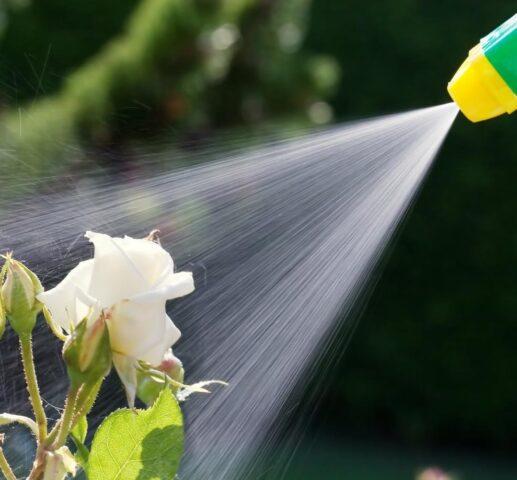
Foliar treatment in summer is carried out with obvious signs of copper deficiency
How to treat roses with copper sulfate in the fall
Spraying roses with copper sulfate is important not only in spring, but also in autumn. The work is planned after the leaves fall. You need to do this:
- Carry out pruning.
- Remove all foliage and branches and burn.
- Dig up the soil in the root zone.
- Prepare a highly concentrated solution of copper sulfate (3% to 5%).
- Pour into a spray bottle and spray evenly over the surface.
- After this, sprinkle with soil.
- Mulch roses for the winter and make a shelter.
Watering the soil allows for disinfection. This is especially important in the fall, since many pests overwinter in the surface layer of soil.
In this case, compost or humus should be incorporated into the soil. If you water frequently, too much copper will accumulate in the soil. This is a heavy element that will take a long time to remove.
Fertilizing the soil with copper sulfate
If signs of copper deficiency are detected, you can not only spray the roses, but also water the soil in the spring with copper sulfate. This is especially important on former peat bogs or on sandy soils with a depleted mineral composition.
For irrigation, prepare a solution with a concentration of 1%. First, 100 g are diluted in 5 liters of warm water, after which a volume of 10 liters is obtained and poured into a spray bottle. The soil can also be watered with a small stream. The indicated amount is enough for 2-3 m².It is advisable to carry out the treatment after pruning and leaf fall, in order to simultaneously destroy spores, larvae and other pests overwintering in the soil along with fertilizer.
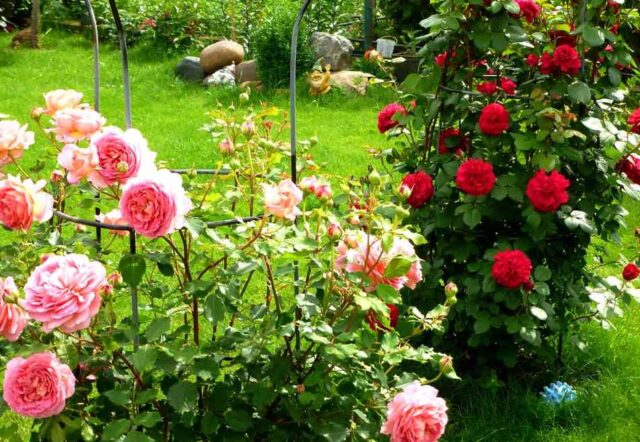
Timely application of copper helps to grow roses healthy
Precautionary measures
Copper sulfate is a potentially toxic substance - the second class of danger to humans. Therefore, when preparing the solution, as well as during processing, certain safety precautions must be observed:
- Wear a mask and gloves.
- Exclude access to children and pets.
- During spraying, do not be distracted, do not eat or drink.
- If work is carried out in a greenhouse, be sure to open the windows and doors.
- Prepare the solution in quantities that can be used at a time.
- Do not dispose of residues into sewers or bodies of water.
- In case of contact with the body, wash with soap and water.
- If splashed into eyes, rinse them under running water for several minutes.
- If the solution gets inside, be sure to take several tablets of activated carbon and drink water.
- If symptoms of food poisoning occur, seek medical help immediately.
Conclusion
Treating roses with copper sulfate is necessary for preventive purposes. The substance has fungicidal properties, so the solution can be used to protect roses from infectious diseases. Also, the use of copper sulfate is justified in case of obvious copper deficiency in the soil.
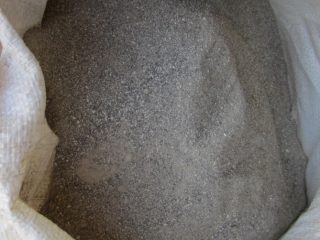
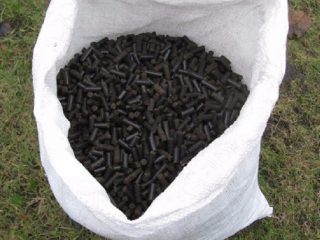
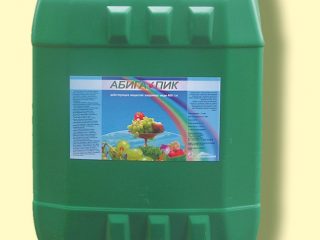

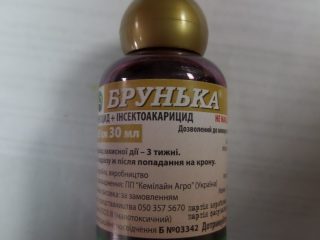
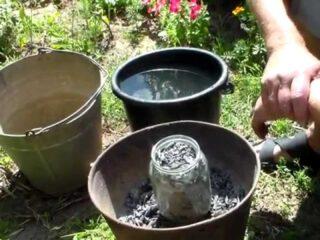
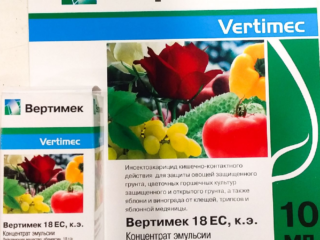
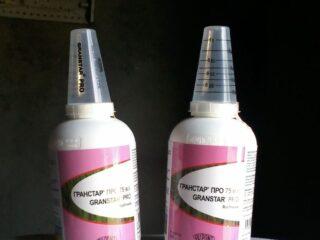
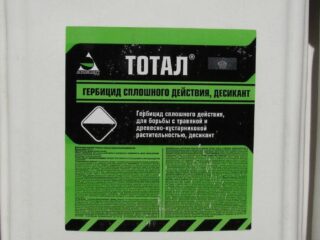
They watered the roses with copper sulfate, and they became covered with yellow-blue spots. What to do?
For the second year in a row, my roses were attacked by black spot. Thanks for your advice. Greetings from Hamburg.